Innovation Program
Efficiency Maine’s Innovation Program provides funding to conduct pilot projects that demonstrate new types of energy efficiency, demand management, beneficial electrification, or alternative energy measures, or new strategies for promoting such measures. The program focuses on measures that show significant potential to be cost-effective and to provide energy savings or greenhouse gas savings but are not yet well understood or established in the marketplace. The measures piloted may or may not prove to be cost-effective or popular in the Maine marketplace. The Innovation Program thus uses smaller projects to generate findings about cost-effectiveness and market demand before making larger investments in incentives and program delivery.
Through its fifth Triennial Plan, Efficiency Maine seeks prioritize the piloting of the next generation of demand management measures. For example, measures that deliver load flexibility may help shape load and balance increasing supplies of variable renewable energy. Load flexibility can play an important role in managing costs and grid reliability, helping to integrate higher penetrations of renewable energy and reducing the curtailment of those resources. As Maine advances in the sophistication of its grid operations, including improved granularity of customer usage data, real-time monitoring of utility distribution circuits, and time-of-use pricing, Efficiency Maine will seek more opportunities to apply load flexibility. Through the Innovation Program, Efficiency Maine will use its pilots to generate data and learnings to inform the development of the necessary systems and rate designs and to develop the next generation of demand management programs.
Reports from some of the Innovation Program’s past pilot projects can be found under the Studies section of Efficiency Maine’s report library.
Phase Change Material in Freezer Spaces
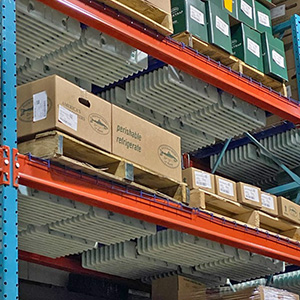 Phase change material (PCM) is a thermal storage technology that can dramatically improve a facility’s refrigeration efficiency and load flexibility when paired with advanced controls. Efficiency Maine piloted rack-mounted PCM and found that, in best-case scenarios, it could reduce a customer’s seasonal demand and energy consumption by up to 80%.
Phase change material (PCM) is a thermal storage technology that can dramatically improve a facility’s refrigeration efficiency and load flexibility when paired with advanced controls. Efficiency Maine piloted rack-mounted PCM and found that, in best-case scenarios, it could reduce a customer’s seasonal demand and energy consumption by up to 80%.
Split System Heat Pump Water Heater
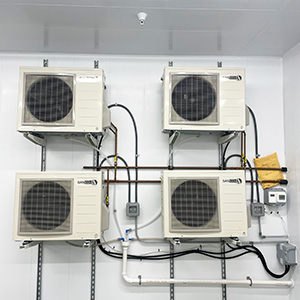 Unlike traditional, standalone heat pump water heaters (HPWH), split-system heat pump water heaters (S-HPWH) separate the compressor and hot water storage tank to accommodate a wider range of installation needs. Efficiency Maine is currently piloting this technology in installations where commercial waste heat can be used for various water heating needs spanning from process to domestic hot water.
Unlike traditional, standalone heat pump water heaters (HPWH), split-system heat pump water heaters (S-HPWH) separate the compressor and hot water storage tank to accommodate a wider range of installation needs. Efficiency Maine is currently piloting this technology in installations where commercial waste heat can be used for various water heating needs spanning from process to domestic hot water.
Hydronic Heat Pump with Thermal Storage
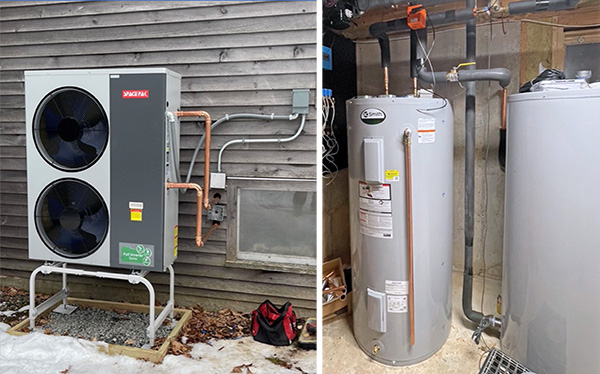 Maine has a large percentage of homes that utilize boilers for their heating needs as well as hot water. These units are difficult to replace with modern heat pumps as their output hot water temperature is usually lower than what the boiler and its distribution can produce. By utilizing electric resistance boost and thermal storage tanks in conjunction with a hydronic heat pump, a home can produce hot enough water to meet the demand of a home on the coldest days. Thermal storage tanks also allow the home to consume energy at off peak periods and take advantage of lower electricity prices.
Maine has a large percentage of homes that utilize boilers for their heating needs as well as hot water. These units are difficult to replace with modern heat pumps as their output hot water temperature is usually lower than what the boiler and its distribution can produce. By utilizing electric resistance boost and thermal storage tanks in conjunction with a hydronic heat pump, a home can produce hot enough water to meet the demand of a home on the coldest days. Thermal storage tanks also allow the home to consume energy at off peak periods and take advantage of lower electricity prices.
Ducted Whole-Home Heat Pumps
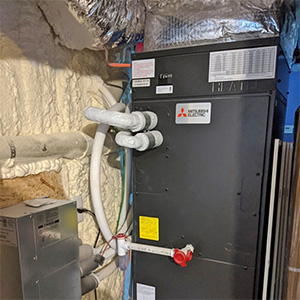
Ducted Whole-Home Air Handler
Ducted heat pumps can utilize existing distribution ducts in both stick-built and manufactured home applications. Efficiency Maine has successfully piloted removing existing fossil fuel systems and replacing them with heat pump solutions that can both heat the entire home throughout the winter on its own and provide cooling through the summer. Whether the fossil fuel furnace was located in a basement or a closet, there are now heat pumps on the market that can serve to replace them.
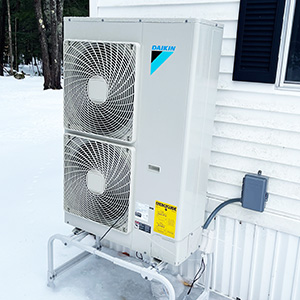
Manufactured Home with Heat Pump Outdoor Compressor
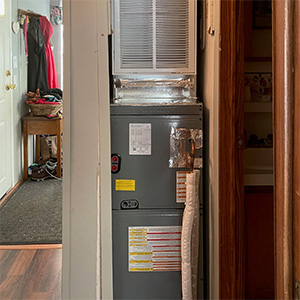
Manufactured Home with Miller Furnace Replacement
